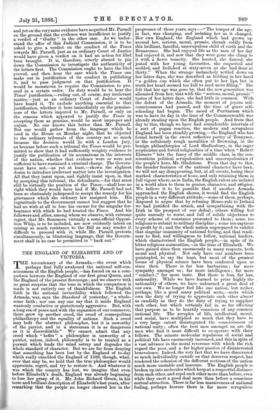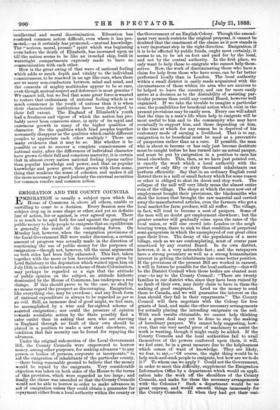THE ENGLAND OF ELIZABETH AND OF VICTORIA.
tercentenary of the Armada,—the event which rperhaps first fully awakened the national self-con- sciousness of the English people, —has forced on us a com- parison between the England of our first great Queen, and the England. of the present Sovereign ; and we observe with no great surprise that the tone in which the comparison is made is not entirely one of thankfulness. The English faith in the national invincibility which followed the Armada, was, says the Standard of yesterday, " a whole- some faith ; nor can any one say that it made England wantonly combative or gratuitously aggressive. But, with a long era of peace and with the expansion of our commerce, there grew up another creed, the creed of cosmopolitan philanthropy and the equality of nations. Such a creed may befit the abstract philosopher, but it is unworthy of the patriot, and in a statesman it is as dangerous as it is discreditable." We cannot admit that any creed which " befits " a philosopher is unworthy of a patriot, unless, indeed, philosophy is to be treated as a pursuit which leads the mind astray and degrades the whole standard of character. But we are far from denying that something has been lost by the England of to-day which really ennobled the England of 1588, though, what- ever that may be, we hold that the true philosopher would appreciate, regret, and try to restore it. And whatever it was which the country has lost, we imagine that even before Elizabeth's death, England was already beginning to lose her grasp of it. Mr. John Richard Green, in his terse and brilliant description of Elizabeth's last years, after remarking that the people no longer cheered her in the progresses of those years, says :—" The temper of the age, in fact, was changing, and isolating her as it changed. Her own England, the England which had grown up around her, serious, moral, prosaic, shrank coldly from this brilliant, fanciful, unscrupulous child of earth and the Renascence. She had enjoyed life as the men of her day had enjoyed it, and now that they were gone she clung to it with a fierce tenacity. She hunted, she danced, she jested with her young favourites, she coquetted and scolded, and frolicked at sixty-seven as she had done at thirty." When the strange melancholy settled down on her latter days, she was described as holding in her hand " a golden cup which she often put to her lips, but in truth her heart seemed too full to need more filling." She felt that her age was gone by, that the new generation was alienated from her, that with the " serious, moral, prosaic" tastes of her latter days, she had little in common. With the defeat of the Armada, the moment of joyous self- consciousness had passed, and the time of grave self- schooling had begun. The mood of Puritanism which was to have its day in the time of the Commonwealth was already stealing upon the English people. And from that day to this, though we have had considerable intervals of a sort of pagan reaction, the modern and scrupulous England has been steadily growing,—the England who has found herself in the sweet reflective poetry of Tennyson,. in the sedulously rough moralities of Browning, in the benign philanthropies of Lord Shaftesbury, in the eager scepticisms and fervid religiosities of a time when " Robert Elsmere " hits the fancy of the middle class, in the con- scientious political scrupulosities and unscrupulosities of the people's hero, Mr. Gladstone. From that day to this, the broader features of the national character have been, we will not say disappearing, but, at all events, losing their marked. characteristics at home, and only retaining them in full vigour where, as in India, the English rulers are isolated- in a world alien to them in genius, character, and religion. We believe it to be possible that if another Armada approached the English shores, it would find. the English people in a very different attitude,—some of them, perhaps, disposed to argue that by refusing Home-rule to Ireland we had justified the attack, and sympathising with the Irish in the prospect of our defeat ; others willing but quite unready to resist, and full of subtle objections to every scheme of resistance presented to them ; some too. religions to submit to military discipline ; some too captious to profit by it ; and the whole nation unprepared to exhibit that singular unanimity of national feeling, and that readi- ness to find, and willingness to follow, national leaders, which characterised the English people,—in spite of its bitter religious animosities,—in the time of Elizabeth. We have gained since then enormously in many respects, both moral and physical. Not only have our numbers been quintupled, to say the least, but most of the greatest boons of physical science have been conferred upon us. since then. There is far less barbarism ; far more sympathy amongst us ; far more intelligence ; far more " conduct ;" far more taste. But there is less, far less, nationality. While we have learned to prize highly the , nationality of others, we have unlearned a great deal of our own. We no longer feel like one nation, but rather, perhaps, like a good many political sects,—sects which own the duty of trying to appreciate each other almost as candidly as they do the duty of trying to supplant each other, but which certainly fail in so far effecting that purpose as to be heartily conscious of any common national life. The scruples of life, intellectual, moral, and social, have multiplied so much that they have to a very large extent disintegrated the consciousness of national unity ; often the best men amongst us are the men who find it most difficult to co-operate with their fellows. The minute molecular repulsions of social and political life have enormously increased, and this in spite of a vast advance in the moral reverence with which the rich regard the poor, and a far higher passion of disinterested benevolence. Indeed, the very fact that we have discovered so much individuality outside us that deserves respect, has rendered the cohesion of the different sections of the nation much more unstable and insecure. The English people is broken up into molecules which keep at a respectful distance from each other, and repel each other more than before, even while they exert a good deal more than before a conscious mutual attraction. There is far less massiveness of national feeling, perhaps because there is far more scrupulous intellectual and moral discrimination. Education has rendered common action difficult, even where it has pro- moted,—as it certainly has promoted,—mutual knowledge. The " serious, moral, prosaic " spirit which was beginning even before the death of Elizabeth, has increased upon us till the nation seems to be like an ironclad ship, built in watertight compartments expressly made to have no communication with each other.
How is the great swing of that wave of national feeling which adds so much depth and vitality to the individual consciousness, to be renewed in an age like ours, when there are tto many non-conductors between mind and mind, and the consents of mighty multitudes appear to be so rare, eveh though mutual respect and deference is most genuine ? We cannot tell, but we feel that some great force is wanted to restore that enthusiasm of national feeling which is so much commoner in the youth of nations than it is when their characteristic institutions have been developed to their full extent. The England of Elizabeth's youth had a freshness and vigour of which the nation has pro- bably never been conscious since, in spite of its rapid and enormous growth in many of the higher qualities of character. Do the qualities which bind peoples together necessarily disappear as the qualities which enable different peoples to appreciate each other multiply ? There are many evidences that it may be so. But whether it be possible or not to recover a complete consciousness of national unity, after the differences of individual character have grown to their full and conscious maturity, it is certain that in almost every nation national feeling ripens earlier than popular knowledge and power, and that as popular knowledge and power grow, there grows with them some- thing that weakens the sense of cohesion and makes it all themore necessary to guard jealously the external securities for common resolve and common action.



































 Previous page
Previous page